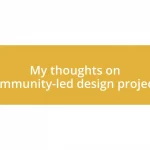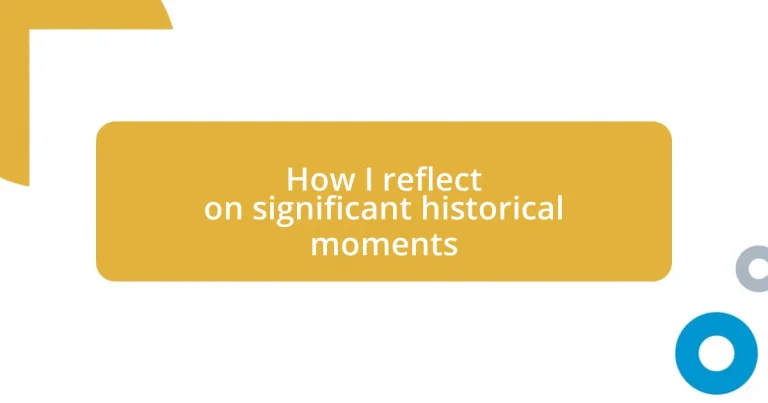Key takeaways:
- Historical reflection goes beyond facts, involving emotional connections to past events and a deeper understanding of societal implications.
- Identifying significant historical moments is guided by their emotional impact, political movements, cultural shifts, and societal changes.
- Researching the context of historical events enriches our understanding and highlights their relevance to contemporary issues.
- Engaging in discussions about history reveals diverse perspectives, fostering empathy and inspiring action towards social change.
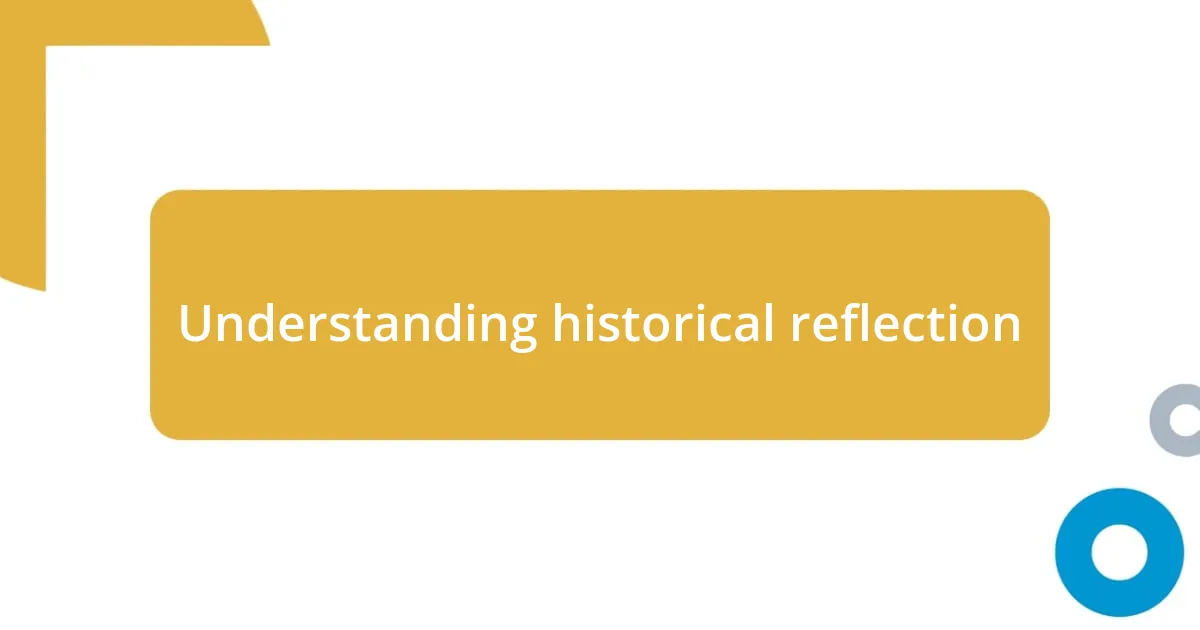
Understanding historical reflection
Understanding historical reflection is like peeling back the layers of time to see how past events shape our present. Have you ever found yourself pondering why a particular moment in history resonates deeply within you? For me, it was the first time I learned about the Civil Rights Movement; the bravery of those individuals ignited a fire in my soul, creating a profound connection to the ongoing struggle for equality.
At its core, historical reflection involves more than just recalling facts; it’s about experiencing the emotions and motivations that drove people to act. I remember sitting in a history class where my teacher shared a survivor’s account from World War II. The pain and hope in that story reminded me that history isn’t just a timeline—it’s a tapestry woven from human experience, filled with both heartache and triumph. Isn’t it fascinating how reflecting on these moments can transform our understanding of ourselves and our society?
The process of reflecting on historical events invites us to question our values and beliefs. By analyzing how people responded to their circumstances, I often find myself asking, “What would I have done in their place?” This introspection challenges me to grow and evolve, reminding me that the lessons of history are not only for historians but for everyone seeking to understand their role in the ongoing narrative of humanity.
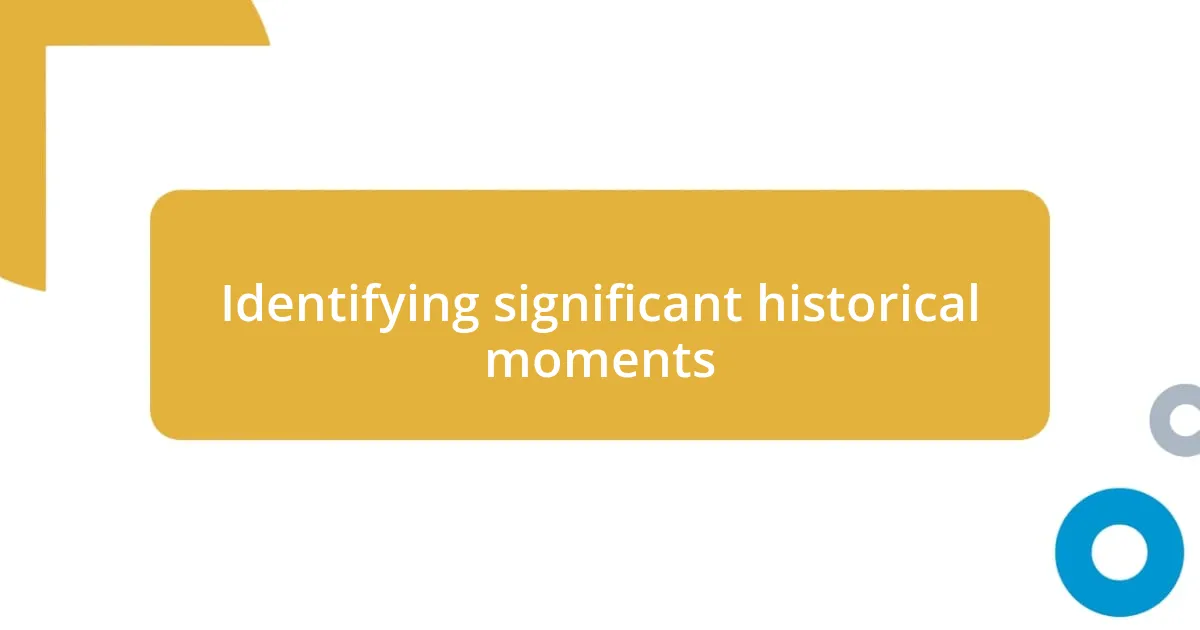
Identifying significant historical moments
Identifying significant historical moments often comes down to recognizing events that evoke a strong emotional response or have led to substantial societal changes. For me, it was learning about the fall of the Berlin Wall that really struck a chord. The imagery of people celebrating their newfound freedom, after decades of division, ignited a sense of hope within me. It made me realize how powerful collective action can be in the pursuit of change.
To help pinpoint these historical moments, I look for:
- Major political movements that reshaped nations
- Cultural shifts that influenced society’s values
- Technological advancements that transformed daily life
- Events marked by widespread public sentiment or protests
- Points of conflict that catalyzed significant change
These markers guide me in understanding why certain moments resonate deeply and remind me that history is not just about dates—it’s about the human experience.
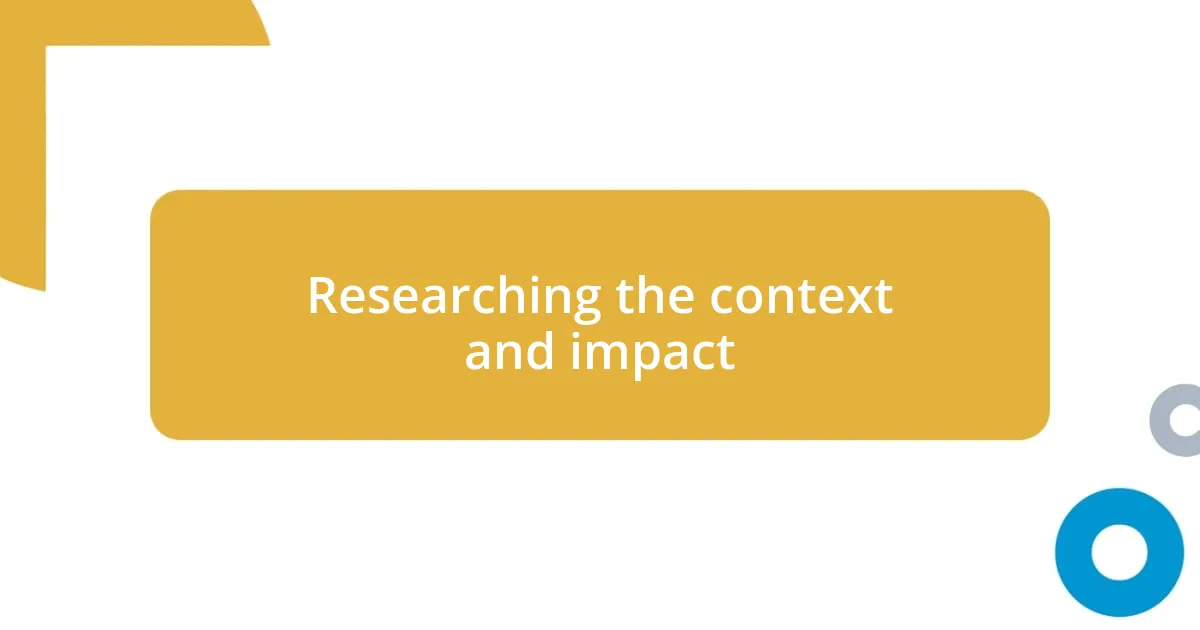
Researching the context and impact
Researching the context and impact of historical moments is like stepping into a time machine that allows me to witness the intricate web of influences surrounding an event. I vividly recall diving into the suffragette movement during a college project, where I uncovered not just the struggle for women’s rights but also the ripple effects on politics and social structures. This deeper understanding transformed my perception, showing that each historical moment is part of a larger narrative that continually shapes our world today.
I find that examining the motivations, values, and societal structures of the time adds significant depth to my reflections. For instance, exploring the economic factors behind the Great Depression opened my eyes to how financial hardship can spur social change and reform. I often think, “How do these patterns still appear in our lives?” This connection to past events illuminates the ongoing relevance of history, urging me to consider how context impacts current issues.
The impact of historical events can often be underestimated until we dive into the stories behind them. When studying the end of apartheid in South Africa, I remember feeling an overwhelming sense of connection to the individuals who risked everything for freedom. Their journey taught me that understanding context isn’t just about facts; it’s about recognizing the sacrifices that contribute to social justice movements, ultimately inspiring me to be an active participant in today’s conversations about equality.
| Aspect | Description |
|---|---|
| Context | The circumstances or background surrounding an event, including social, political, and economic factors. |
| Impact | The enduring effects or changes that result from an event, influencing future generations and societal norms. |
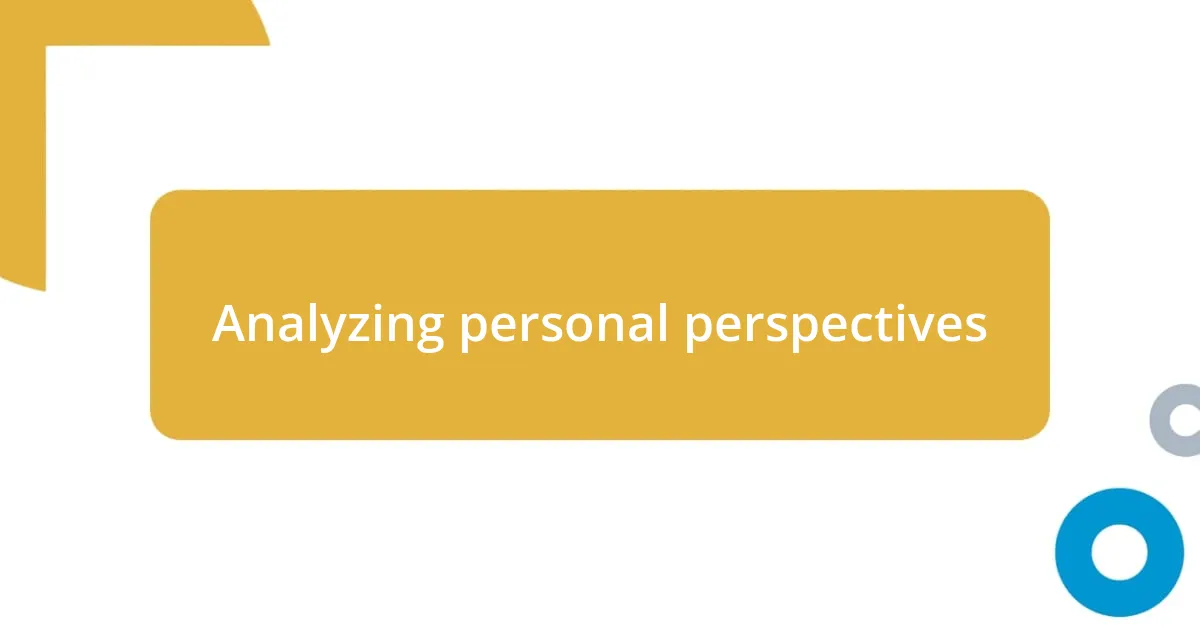
Analyzing personal perspectives
When I reflect on historical moments, I often find myself considering how my own experiences color my understanding. For example, I remember hearing my grandmother’s stories about World War II. Her accounts were filled with fear and resilience, but they also conveyed a deep sense of unity among those who lived through it. This personal connection made me realize how our narratives shape our perspectives on significant events.
It’s fascinating to think about how our backgrounds influence what we deem important in history. I once attended a panel discussion on civil rights, and the speakers shared insights I had never encountered before. One speaker, in particular, described the feeling of marching during the 1960s—a blend of hope, determination, and vulnerability. I found myself questioning, “What would I have done in that moment?” This kind of introspection allows me to connect more deeply with the struggles and triumphs of those who came before me.
Furthermore, I believe our emotional responses play a crucial role in how we analyze historical moments. A few years ago, while researching the Rwandan Genocide, I was overwhelmed with empathy for those who endured unimaginable loss. It made me wonder how we can facilitate healing and prevent such atrocities in the future. Reflecting on these sentiments encourages me to engage more thoughtfully with history, transforming cold facts into compelling stories that resonate with the heart.
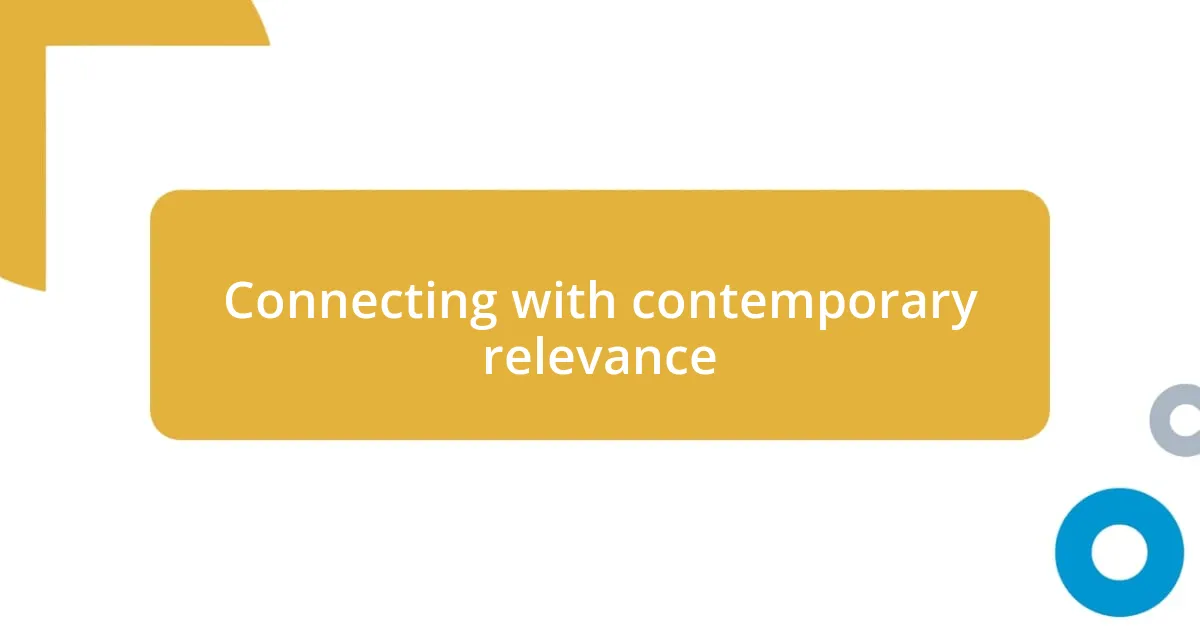
Connecting with contemporary relevance
Reflecting on historical moments often unveils striking parallels with contemporary issues. I remember reading about the civil rights movement and feeling a profound sadness, realizing that the fight for equality is far from over. It led me to ponder: “What does it say about us if we’ve made little progress since then?” These connections challenge me to engage more actively in current social dialogues, seeing them as extensions of past struggles.
When considering the impact of significant events, I find it crucial to participate in discussions around these themes today. For instance, while volunteering for a local social justice organization, I often recall the bravery demonstrated during key protests. Their stories remind me that activism isn’t just about grand gestures—it starts with everyday choices. How can we harness that spirit to push for change in our own communities?
My reflections often touch on the emotional weight that historical moments carry, igniting a sense of urgency within me. After learning about the Stonewall riots, I felt a deep resonance with the LGBTQ+ rights movement that emerged from that moment. I couldn’t help but ask myself, “What must it have felt like to stand up against oppression in such a raw and public way?” This introspection fuels my commitment to advocating for inclusivity and understanding in today’s society, inspiring me to think of my role as part of an ongoing journey rather than a solitary experience.
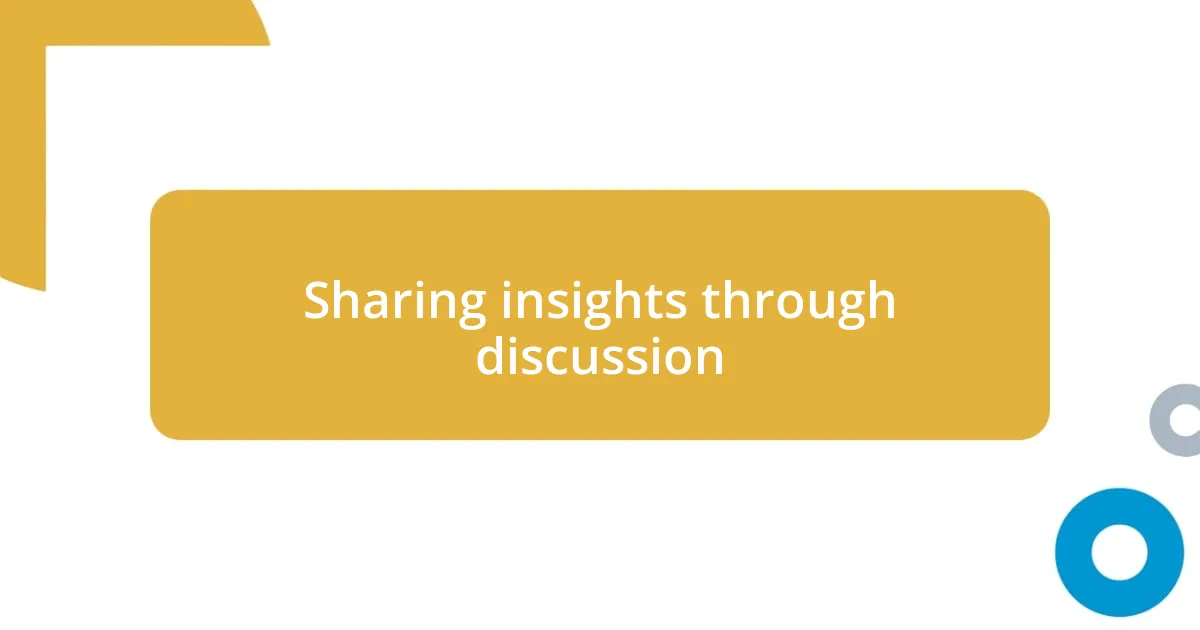
Sharing insights through discussion
Engaging in discussions about significant historical moments often unveils layers of meaning that I may not have previously considered. For instance, I vividly recall a dinner conversation about the fall of the Berlin Wall. As my friend recounted their experience of being there, I could almost feel the electric atmosphere of hope and liberation. It sparked a critical question in my mind: “How do we maintain that spirit of collective triumph in today’s society?” Sharing these insights allows me to empathize with others’ experiences, enriching my understanding of the past.
I find that participating in discussion forums can illuminate perspectives that challenge my own beliefs. One evening, I joined a community workshop focused on the effects of colonialism. As participants shared their varied backgrounds, I realized how each story weaved into a broader tapestry of history. The conversations prompted me to reflect on my own positionality: “What responsibilities do I carry due to my background?” This exchange of ideas cultivates a deeper appreciation of how interconnected our histories are.
Reflecting on these discussions often stirs emotional currents within me, pushing me to take action. I remember attending a lecture on the Holocaust, where the survivor’s heartfelt account moved me to tears. It led me to ask, “What can I do to honor their story?” The impact of sharing such profound insights stayed with me, motivating me to volunteer for organizations dedicated to education about human rights. Engaging in these conversations not only deepens my connection with the past but also ignites a passion for creating change in the present.





